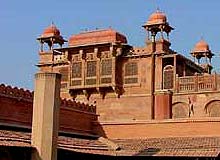 Located in Bikaner, the Junagarh fort is one of the most impressive fort complexes in India. Junagarh fort was built by Raja Rai Singh in 1588 AD. Junagarh fort is one of those few forts that are not built on a hilltop. The fort complex consists of palaces, courtyards, pavilions and balconies. The walls palaces etc. are ornamented with carved stones, marbles, paintings and inlaid semi-precious stones. Each palace in the Junagarh fort complex was built by a different ruler over the centuries.
Located in Bikaner, the Junagarh fort is one of the most impressive fort complexes in India. Junagarh fort was built by Raja Rai Singh in 1588 AD. Junagarh fort is one of those few forts that are not built on a hilltop. The fort complex consists of palaces, courtyards, pavilions and balconies. The walls palaces etc. are ornamented with carved stones, marbles, paintings and inlaid semi-precious stones. Each palace in the Junagarh fort complex was built by a different ruler over the centuries. One of the most impressive structures in the Junagarh fort complex is the Anup Mahal. Its elaborately
decorated walls are covered in red and gold with colored glass inlay. The Anup Mahal is a multi-storied palace and was the governance chambers for the rulers. Its beautifully decorated rooms display the valuables of the royal family. In the Badal Mahal or the clouds palace White plaster pillars are decorated in delicate patterns and covered with gold leaves. The Badal Mahal or Cloud Palace's walls are painted with a fresco of rain clouds. In the rain fresco photograph there is a painting of Krishna and Radha surrounded by the blue cloud motifs.
Junagarh fort is surrounded by high walls and deep moats. There are 37 bastions that guard the fort and the fort is accessible through two Gates. The Suraj Pol or the Sun gate is the main entrance to the Junagarh fort. It is interesting to note that the Junagarh fort remained almost unconquered throughout its history. Inside the Junagarh fort there are 37 palaces, temples and pavilions. All these structures are marvels in red sandstone. The palaces inside the fort have elegantly carved windows, balconies, towers and kiosks. The mirrors, paintings and carved marble panels in the Moon palace are worth having a look. Another fascinating palace inside the fort, the Phool Mahal or Flower palace was decorated with glasses and mirrors. Other interesting places to watch in the Junagarh fort are the Ganga Niwas, Dungar Niwas, Vijay Mahal and Rang Mahal. Junagarh fort has a museum, which has an extensive collection of various things belonging of the past.
No comments:
Post a Comment